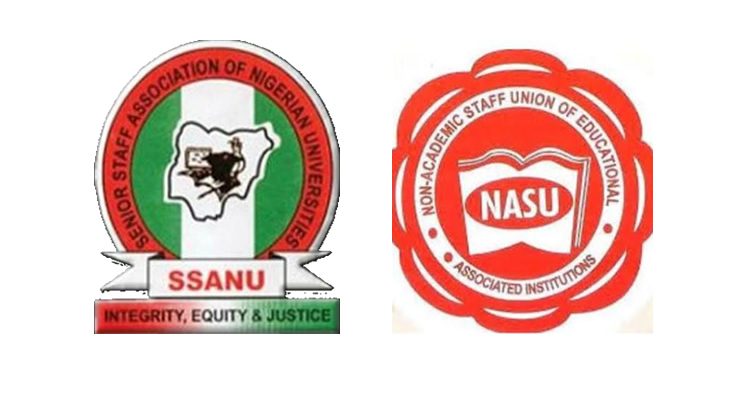On October 17, 2023, the Joint Action Committee (JAC) of the Senior Staff Association of Nigerian Universities (SSANU) and the Non-Academic Staff Union of Universities and Allied Institutions (NASU) expressed strong discontent regarding the recent inauguration of a committee aimed at renegotiating the agreements between the Federal Government and university-based unions. The unions criticized this event as a performative act devoid of genuine engagement or consideration for all stakeholders involved. Their statement, co-signed by SSANU President Muhammed Ibrahim and NASU President Peters Adeyemi, emphasized that the government appeared to prioritize the Academic Staff Union of Universities (ASUU), effectively sidelining other unions in the process. This perceived negligence raises concerns about the fairness and inclusivity of the negotiations, as it seems to establish an imbalanced dynamic favoring academic staff over their non-academic counterparts.
The Federal Government’s Minister of Education, Tahir Mamman, revealed the formation of a renegotiation committee led by Yayale Ahmed, tasked with reviewing the 2009 agreements within a constrained timeframe of three months. This latest committee represents the fourth attempt at renegotiation since 2017, following earlier committees helmed by different leaders, including Wale Babalakin, Munzali Jubril, and Nimi Briggs. However, the recurrent nature of these negotiations and their lack of substantial outcomes highlight the systemic challenges and ongoing dissatisfaction among university-based unions. The dissatisfaction particularly stems from how these processes are perceived to disproportionately favor ASUU, as reflected in the committee’s composition and the tenor of the inauguration event, which appeared to further entrench existing biases.
In their joint statement, SSANU and NASU decried the inauguration proceedings as a humiliating experience that underscored the marginalization of non-academic staff. They observed that the Minister’s inauguration speech focused predominantly on ASUU, reducing the roles of other unions to mere afterthoughts. The symbolic positioning of ASUU’s president at a “Responsibility table” while the presidents of the other unions sat separately was viewed as an illustration of the disrespect and inequality embedded in the renegotiation process. The perception among SSANU and NASU is that they were merely invited to lend legitimacy to an already predetermined outcome, thereby undermining their collective voice in addressing crucial issues that affect their members.
Such dynamics have raised concerns about the potential outcomes of the ongoing negotiations, as JAC representatives expressed fears that the non-teaching staff’s interests would be disregarded. They characterized the inauguration as a “charade” that signals a bias favoring academic staff, jeopardizing the position and rights of non-teaching staff in the university system. The unions articulated their disappointment with the approach taken by the government, hinting at a lack of genuine intent to engage with all university stakeholders meaningfully. Such perceptions could foster resentment and resistance among the unions if their roles continue to be minimized in the renegotiation discourse.
Meanwhile, the Congress of University Academics (CONUA) has also voiced its concerns about being excluded from the renegotiation committee. In a formal letter addressed to the Minister of Education, CONUA President Dr. Niyi Sunmonu insisted that the absence of their representation in discussions about academic staff concerns represents a significant oversight. This exclusion not only jeopardizes the interests of CONUA members but could also lead to agreements being made without accounting for their perspectives and needs. The union’s position underscores the critical need for inclusive dialogue among university-based staff unions, as neglecting subsets of the academic community could lead to broader dissent and conflict within the sector.
CONUA’s demand for inclusion highlights a growing recognition among various university staff unions of the importance of collective negotiation and representation in shaping the future of academia in Nigeria. The union pointed out that discussions lacking their input are inherently flawed, as decisions made would have direct implications for their members, thus effectively disenfranchising them in critical matters affecting their professional lives. They called for immediate action to ensure all relevant parties, including CONUA, are invited to participate in negotiations, ensuring a comprehensive and fair approach to addressing the challenges facing Nigerian universities.
As this situation unfolds, it raises important questions about the efficacy and fairness of the government’s negotiation strategies concerning university staff unions. The ongoing tensions between the various unions and the Federal Government underscore a deeper, systemic issue of representation and inclusivity within the academic sector. Without a genuine commitment to engage all stakeholders equitably, the potential for heightened dissatisfaction among university staff remains significant. The call for inclusion from unions like CONUA, combined with the discontent expressed by SSANU and NASU, suggests that substantial reforms may be necessary to foster an environment where all voices are heard and respected in the pursuit of sustainable solutions for Nigeria’s educational landscape.














